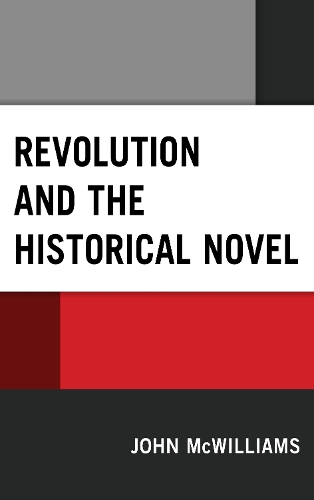
Revolution and the Historical Novel
(Paperback)
Available Formats
Publishing Details
Revolution and the Historical Novel
By (Author) John McWilliams
Bloomsbury Publishing PLC
Lexington Books
7th November 2019
United States
Classifications
Professional and Scholarly
Non Fiction
Nature and the natural world: general interest
809.381
Physical Properties
Paperback
360
Width 154mm, Height 225mm, Spine 27mm
540g
Description
John McWilliams has written the first, much needed account of the ways the promise and threat of political revolution have informed masterpieces of the historical novel. The jolting sense of historical change caused by the French Revolution led to an immense readership for a new kind of fiction, centered on revolution, counter-revolution and warfare, which soon came to be called the historical novel. During the turbulent wake of The Declaration of the Rights of Man, promptly followed by the phenomenon of Napoleon Bonaparte, the historical novel thus served as a literary hybrid in the most positive sense of that often-dismissive term. It enabled readers to project personal hopes and anxieties about revolutionary change back into national history. While immersed in the fictive lives of genteel, often privileged heroes, readers could measure their own political convictions against the wavering loyalties of their counterparts in a previous but still familiar time. McWilliams provides close readings of some twenty historical novels, from Scott and Cooper through Tolstoy, Zola and Hugo, to Pasternak and Lampedusa, and ultimately to Marquez and Hilary Mantel, but with continuing regard to historical contexts past and present. He traces the transformation of the literary conventions established by Scotts Waverley novels, showing both the continuities and the changes needed to meet contemporary times and perspectives. Although the progressive hopes imbedded in Scotts narrative form proved no longer adaptable to twentieth century carnage and the rise of totalitarianism, the meaning of any single novel emerges through comparison to the tradition of its predecessors. A foreword and epilogue explore the indebtedness of McWilliamss perspective to the Marxist scholarly tradition of Georg Lukacs and Frederic Jameson, while defining his differences from them. This is a scholarly work of no small ambition and achievement.
Reviews
Like Martha Bowden in Descendants of Waverley (CH, Mar'17, 54-3103), McWilliams (emer., Middlebury College) insists on a continuous tradition of historical fiction going back to Walter Scott. However, McWilliams also critiques the Marxist theory that has underpinned scholarship on historical fiction since Gyrgy Lukcs's The Historical Novel (Russian, 1937). On the one hand, revolution is prime material for historical novel settings; on the other, though the settings may be revolutionary, the genre is not. Drawing on fiction from the Americas, Britain, France, Italy, and Russia, McWilliams identifies several structural characteristics of the genre that generate narrative stability and restorationnot, that is, the dictatorship of the proletariat. These include its preference for middle- and upper-class characters; its emphasis on neutral ground (an arena contested by forces of the Old Order and the New, but possessed by neither), within which the action unfolds; and its juxtaposition of the wavering hero, derived from Scotts Waverley, with the fanatics the eventual losers. Except for Boris Pasternaks downbeat Dr. Zhivago (1957), historical novels bring waverers to a chastened self-awareness that projects hope for the cultural future while eradicating the fanatics. An accessible, thought-provoking contribution that challenges some commonplaces in the field. Summing Up: Recommended. Upper-division undergraduates through faculty. * CHOICE *
I find Revolution and the Historical Novel a very stimulating manuscript. It is not only well writtenit is vigorously and subtly argued. It addresses issues of continuing importance and it offers many new insights into specific books. What it does with Gone with the Wind is especially impressive. -- Wayne Franklin, University of Connecticut
Author Bio
John McWilliams is College Professor of Humanities, Emeritus at Middlebury College.
